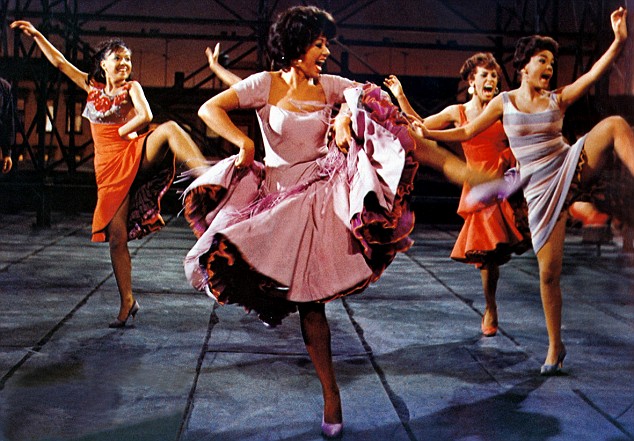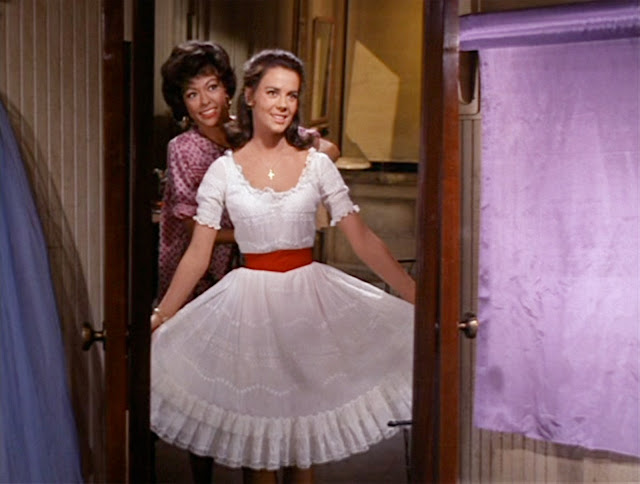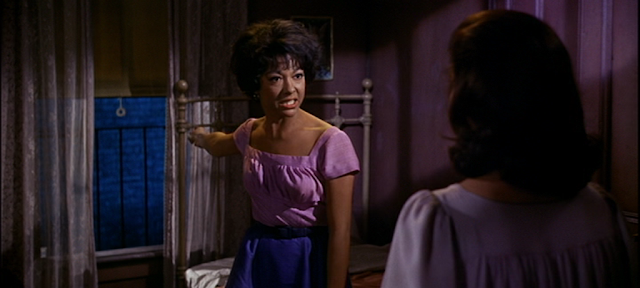[Trigger warning: for discussion of rape] | Spoilers ahead
West Side Story is one of my absolute favorite musicals. I adore the catchy lyrics, the breathtakingly exquisite choreography and cinematography, the heartbreaking love story. A modern Romeo and Juliet taking place in New York City amongst two rival gangs — one white, one Puerto Rican — it tackles racism, bigotry, murder and teen angst. But many audiences overlook the film’s portrayal of gender, female friendship and rape culture.
Anita and Maria are dear friends who confide in each other. Two strong women who know what they want and aren’t afraid to speak their minds. Rather than the film pitting the two women against each other, they support one another. But as awesome as this is, I can’t shake the feeling that we’re witnessing a Madonna/whore dichotomy in female archetypes.
Maria is sweet and naïve. When Tony first meets Maria, he asks her if she’s joking. She responds, “I have not yet learned how to joke that way.” Her brother Bernardo and Anita try to shield her from trouble as people view her as pure and virginal. Reinforcing this imagery, we see Maria pray in front of the Virgin Mary and in “Maria,” Tony sings “say it [her name] soft and it’s almost like praying.” But Maria tries to resist the label of purity as she tells her brother a white dress is for babies.
In stark contrast to Maria, Anita is opinionated, savvy, charismatic and flamboyant (and clearly my favorite character!). Outgoing and gregarious, she wears colorful frocks, as opposed to Maria’s white gowns. As much as I love her, Anita reinforces the feisty Latina harlot stereotype. Of course the depiction of race is problematic as the film employed brownface make-up for its Latino/a characters.
Anita proudly asserts her sexuality, eagerly singing about how she’s “gonna get her kicks” and “have a private little mix” with her boyfriend Bernardo in “Tonight.” The chemistry and banter between Anita and Bernardo reveal their tender feelings for one another. But their relationship is framed in sexuality. Even though Maria and Tony sleep together, their relationship is constantly surrounded by dreamy words of love, commitment and wedding imagery. While Anita sings about sex in “Tonight,” Maria croons about seeing her love and how the “stars will stop where they are.” It’s as if there’s a right and a wrong way to portray female sexuality.

Throughout the film, pragmatic cynic Anita tries to protect idealistic dreamer Maria. She expresses her worries about her dating Tony at the bridal shop. Later, in “A Boy Like That,” Anita warns Maria to stay away from him as he “wants one thing only” and “he’ll kill her love,” like he murdered hers. But Maria’s buoyant hope stave off Anita’s concerns.
It’s interesting how other characters treat women in the film. In “America,” the Sharks sing about the xenophobia and racism they experience while the women sing about their aspirations and the promise of a better life in NYC. One of the Jets exasperatedly wonders why they’re fooling around with “dumb broads.” To which Graziella retorts, “Velma and I ain’t dumb.” Anybodys is the tomboy who desperately longs to be in the Jets. She hangs around the guys, spits on the ground and insults women, and sees the male gender as far more desirable. But rather than depicting gender variance or even a trans character, the Jets view Anybodys as a defective female. Some of the Jets taunt her that no one would want to sleep with her. Because apparently to them (and patriarchal society at large), a woman’s status resides only in her beauty, sexuality and desirability.
While gender relations are far from perfect, the Sharks and their girlfriends debate equally. But the Jets seem to view women as nothing more than objects. This objectification continues in the assault and attempted rape of Anita.
Maria begs Anita to give a message to Tony at Doc’s drug store. Anita reluctantly does so. When she arrives, she encounters violence at the hands of the Jets. In Aphra Behn (of Guerilla Girls)’s Gender Across Borders article, she disparages the ’09 Broadway revival as it turns the assault and “mock rape” of Anita into a real rape with the unzipping of A-rab’s pants:
“Why does everyone from Broadway to High School stage this scene as a fully realized rape scene? Because rape culture does not allow us to see it as anything but such a scene.”
Behn may be right that this scene reinforces rape culture. But she’s completely wrong attempting to differentiate between a mock rape and a real rape. Rape is rape. Period.
I always interpreted the film version of West Side Story displaying assault and attempted rape. If Doc hadn’t stepped through the door and intervened, Anita would have been raped. Does it really make it better that the Jets were pretending to rape? Or that they were prevented from committing rape? No, no it doesn’t.
Behn states the original stage direction was to assault Anita and treat her like an object, not a sex object. But rape is not a sexual act. It’s an act of power. The Jets feel powerless over the death of Riff, their friend and leader. Being young, they’re tired of everyone telling them what to do, how to feel and behave. When Anita enters Doc’s drug store, she materializes into an outlet for their frustration and pain. As the Jets hold racist views, they see Anita, as a Latina, an other — an object to overpower
The Jets verbal and physical harassment and attempted rape disgust and disturb the audience. When Rita Moreno filmed that scene,
she broke down and sobbed for 45 minutes for it reminded her of past pain, anger and trauma, including an attempted rape. This scene portrays the ramifications of patriarchy, racism and rape culture. It shows how society normalizes violence against women.
Anita’s anger, hatred and shame at the boys for what they’ve done to her ultimately causes the tragic ending. Her lie — that Chino murdered Maria — causes Tony to run around screaming for Chino to kill him too, which he does. Tony’s death causes hatred to fester inside Maria, corrupting the ingenue. Rather than evoking sympathy for an assault survivor, it seems we the audience are supposed to be angry at Anita for her treachery.
Anita is considered most people’s favorite character. And in my opinion, rightfully so. She’s a badass. While audiences continually embrace the role of Anita — awarding an Oscar to Rita Moreno, a Tony to Karen Olivo in the ’09 revival — it appears the film tries to vilify her, a cautionary warning to women. Women can be good and nice, like Maria, or sexually assertive and ultimately manipulative liars destroying lives, like Anita.
Women are supposed to choose the “right” kind of woman to emulate or suffer dire consequences.






I really love the film West Side Story, not only because it’s so well made, the beautifully choreographed dancing, the richly-colored costumes and photography, the cinematography, the songs/scenes and the characters as a whole, which made it believable in many ways, as well as the brilliant Bernstein musical score and the very story behind West Side Story, but because of the message that this great classic sends.
Although the film West Side Story sends a double-edge message, it’s a great message nonetheless. While WSS sends the message of the destructive consequences of racial/ethnic hatred and the senseless of gang violence, it also sends the message that reconciliation between people, as difficult as it can be, is still possible, given the fact that several Jets and Sharks came together to help carry Tony’s body off after he’d been shot and killed by Chino.
About “Rather than evoking sympathy for an assault survivor, it seems we the
audience are supposed to be angry at Anita for her treachery.” – I didn’t feel that way about Anita when I saw it, because I knew she was “goaded” into that by the Jets. It made me think “Jets, why did you morons make her do that?!?!?!”
I honestly don’t see the film West Side Story quite in the way in which it’s viewed here. I see this film as something to learn from, despite the fact that it’s fiction (although closer to reality in some respects.), because it carries a very good message, that’s kind of a double-edged sword: The deleterious consequences of racial/ethnic hatred and the gratuitous violence that often ensues, and yet, as the ending, where several Jets and Sharks come together to carry Tony’s body off after he’s been shot and killed by Chino, indicates, there’s also room for intergroup reconciliation, as well.